Swollen feet can be caused after wearing high heels or ill-fitting shoes for a longer duration or indulging in high-impact activities like running. Aging, pregnancy, nutritional deficiencies, premenstrual syndrome, and poor blood circulation can also make the feet swell. Pregnant women, diabetics, and people with heart issues are more prone to this kind of edema or swelling. There are various home remedies that can soothe and cure swollen feet, mostly by utilizing the products you have access to at home.
Epsom Salts
The most effective and common remedy for swollen feet is letting the feet soak in a bucket of warm water containing Epsom salts. The magnesium sulfate present in the salt is absorbed through the skin of the feet and in turn, reduces the swelling and improves circulation. Water with Epsom salts is even capable of neutralizing feet odor! Just take half a cup of Epsom salts and mix it in a bucket filled with warm water and then, soak your feet in it for about 15-20 minutes.
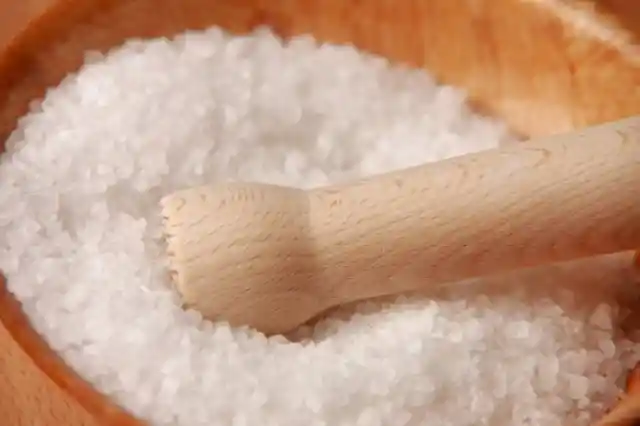
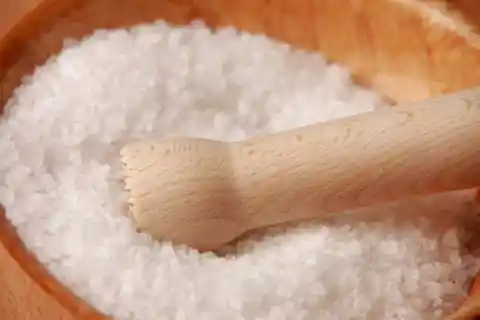
Massage
Massage is an excellent option to relax sore muscles and improve circulation. Putting pressure on concerned areas pushes lymph drainage, which lessens inflammation. Rubbing the feet gently but firmly in the direction of the heart can treat swollen feet. Application of mustard oil while massaging can have a curing effect. While a foot massage that’s done professionally is undoubtedly helpful, this process is an easy remedy to perform at home.
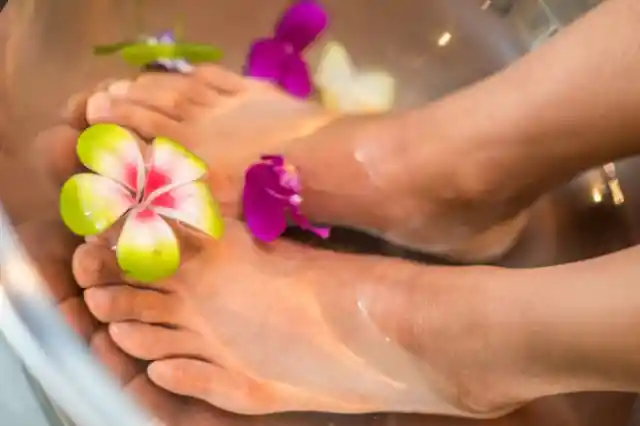

Hydration
Many people don’t drink enough quantity of water. Consequently, the body is alerted for dehydration and starts retaining the water that’s accessible to it in order to prevent any complications. This extra amount of water leads to swelling, and gravity pulls this swelling downwards. So, increasing your water intake can contribute towards diluting sodium in the cells, which results in inflammation and swelling. Lemon water can be really effective – the inflammatory properties of this fruit might assist in flushing the toxins out of your body.


Yoga
Lack of physical activity can also cause swollen feet. Yoga is an ideal way to improve circulation throughout the whole body. The gentle movements of yoga restrict the blood from pooling in the feet and also, the ankles. Yoga postures that involve flexing and extending the feet are specifically effective to alleviate the swelling. It is advised to take some classes when you are starting to make sure that you are doing all the poses in the correct way, but later, it is easy and normal to do yoga at home.


Swimming
Taking a good swim does more than just relaxing the body; it alleviates the swelling present in the feet as well as the ankles. The buoyancy offered by the water puts minimum pressure and impact on the lower extremities, which, as a result, lowers inflammation. Cooler temperature gives extra relief. A 30-minute swim has a positive effect on circulation and is able to help in removing excess fluid present in the feet. For women who are pregnant, just standing in water that reaches their torso can help relieve the pain in the feet.


Magnesium Supplements
Swollen and inflamed feet might be due to magnesium deficiency, considering magnesium’s tendency to reduce water retention. Supplements may provide relief until dietary alterations take effect. Adding around 200 mg two times a day will help in easing the inflammation, but it is crucial to talk to a doctor before consuming any new supplements, especially when one is already taking some other medication. People having kidney disease should keep away from magnesium supplements and take magnesium-rich foods as an alternative.
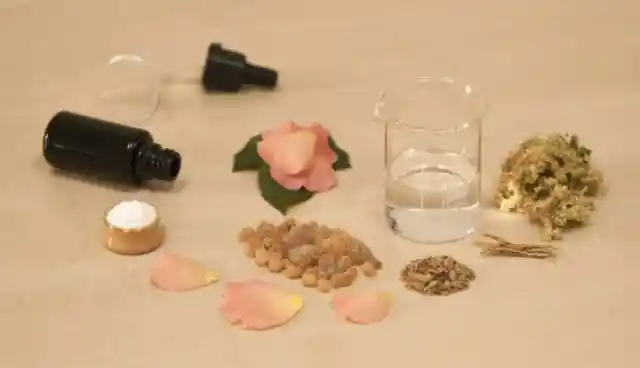

Elevation
One of the major supporters of swollen feet is inverted gravity. Propping up the feet while in a sitting or a lying position can make a significant difference – just make sure that the feet are placed a few inches above the heart. Flexing the ankles occasionally will lead to improved blood circulation in the extremities.


Dandelion
Dandelion is an effective home remedy for swollen feet. This so-called weed has diuretic properties that allow it to process excess fluids and ease water retention. Drinking dandelion tea can help in the regulation of the levels of sodium in the body. Let the mixture steep for a minimum of 10 minutes and take it twice a day to see the benefits of this plant in relieving foot edema.


Essential Oils
Massaging the feet with essential oils like eucalyptus, peppermint, and chamomile can ease inflammation. Essential oils possess the essence of a particular plant and often provide various benefits. For example, lavender is popular for relaxation but is even an anti-inflammatory that can help alleviate the swelling. Peppermint reduces pain as well as it is cooling. Add essential oils to a carrier including olive oil or coconut oil and use them for a foot massage, or add them to Epsom salts before making a foot soak.


Support Hose
Support hose and compression socks can considerably reduce leg inflammation in people who have to endure this issue regularly. The tight-fitting socks are capable of preventing blood from pooling in the feet and restrict the formation of varicose veins, hence, improving circulation.


Reducing Sodium Intake
There are plenty of health benefits connected with decreasing sodium intake, and individuals with swollen feet may observe an improvement if they consume less salt. Doctors will attempt at identifying the source of the fluid build-up and might recommend switching to a low-sodium diet as an early treatment step. Read carefully the food labels to find out the salt content, and avoid adding table salt to season dishes.


Weight Loss
Weight loss will take some stress off swollen feet and ankles. Studies have shown that even moderate weight loss has a positive effect on the dynamic plantar loading and foot function in adults who might be overweight. Diet and regular exercise can help individuals with swollen ankles to move towards a healthier weight, which is advantageous for general wellness and can reduce the severity of any swelling in the future.


Eating Coriander Seeds
Coriander is a member of the parsley family, and its leaves are the famous herb, cilantro. The seeds of the coriander plants have natural anti-inflammatory properties and can assist in minimizing water retention while also encouraging blood circulation. Although more research is required, a few studies say that coriander possesses analgesic and antimicrobial properties that can help maintain clean and pain-free feet. Prepare coriander tea by boiling a cup of water with three tablespoons of coriander seeds and allowing the mixture to simmer until the water is reduced to half its initial quantity. Strain this mixture and let it cool down before drinking. Experts advise drinking coriander tea two times a day until the swelling subsides.
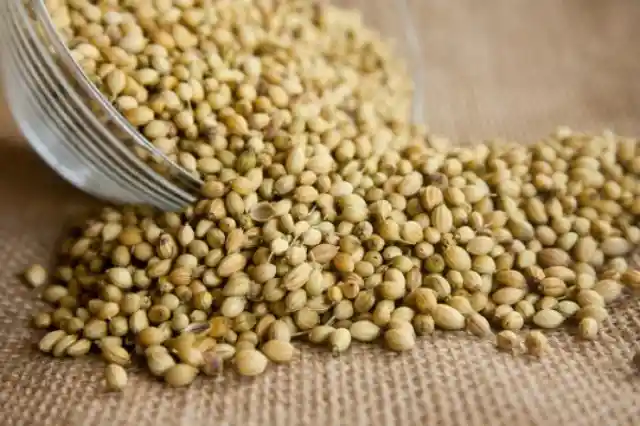
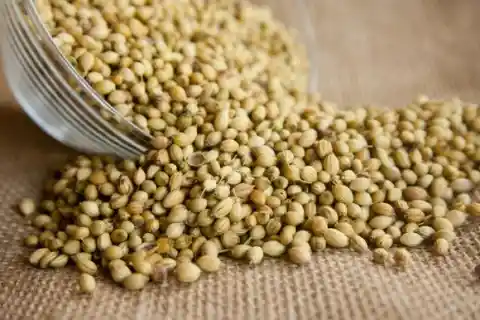
Take High-Potassium Foods
In addition to reducing salt intake, people who have swelling in the feet can try to add more potassium to their everyday diet, though any huge dietary changes must be first consulted with a doctor. Potassium is a diuretic, which implies that it helps curb water retention. Apart from these potential, particular benefits, potassium that’s found in bananas, sweet potatoes, and oranges can improve heart and blood pressure health situations and also, maintain good health of bones and muscles.


Right Time To See A Doctor
At times, home remedies are just not enough. If swelling or pain in the feet continues for over a few days, it is time to seek professional medical assistance. Rigorous physical activity or standing the whole day are common reasons for swollen feet, but if relaxation and rest fail to ease the symptoms, a more critical issue can be the origin. Heart failure, deep-vein thrombosis, and kidney disease can all lead to swollen feet, but people having these conditions may have other symptoms too. Diagnostic tests can ascertain any underlying causes.

